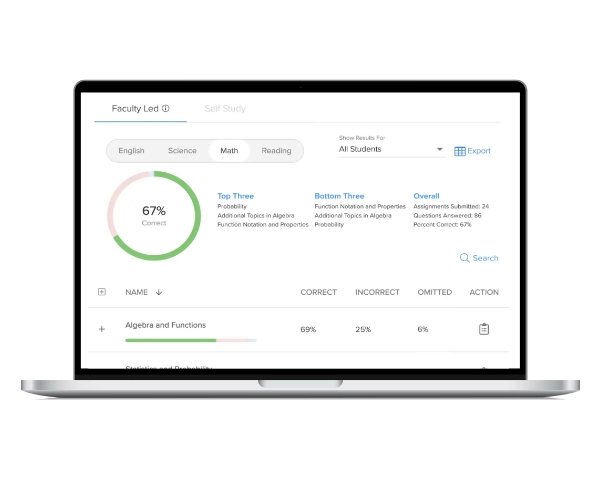When Amanda Gorman became the youngest poet in history to perform an original recitation at a U.S. presidential inauguration, she didn’t take the honor (or the responsibility) lightly. Long before Inauguration Day, Gorman spent hours researching, writing, and repeatedly reading her work in preparation for the big moment. Even though an AP® exam is very different from reciting an inaugural poem, AP English Literature and Composition teachers must also devote a lot of time to preparing for the exam. Like their students, they must carefully think about everything that is needed for success. This means going over every topic and skill in the course.
Because they are aware of how challenging the AP Literature exam is, AP Lit instructors recognize the value of content review. That being said, according to the College Board®‘s score distribution report for the 2022 AP exams, 77.9% of students who took the AP Literature test passed with the needed score of 3 or higher.1 This high rate of success means that with a strong last-minute AP Literature test review, teachers can offer their students a strong probability of earning college credit.
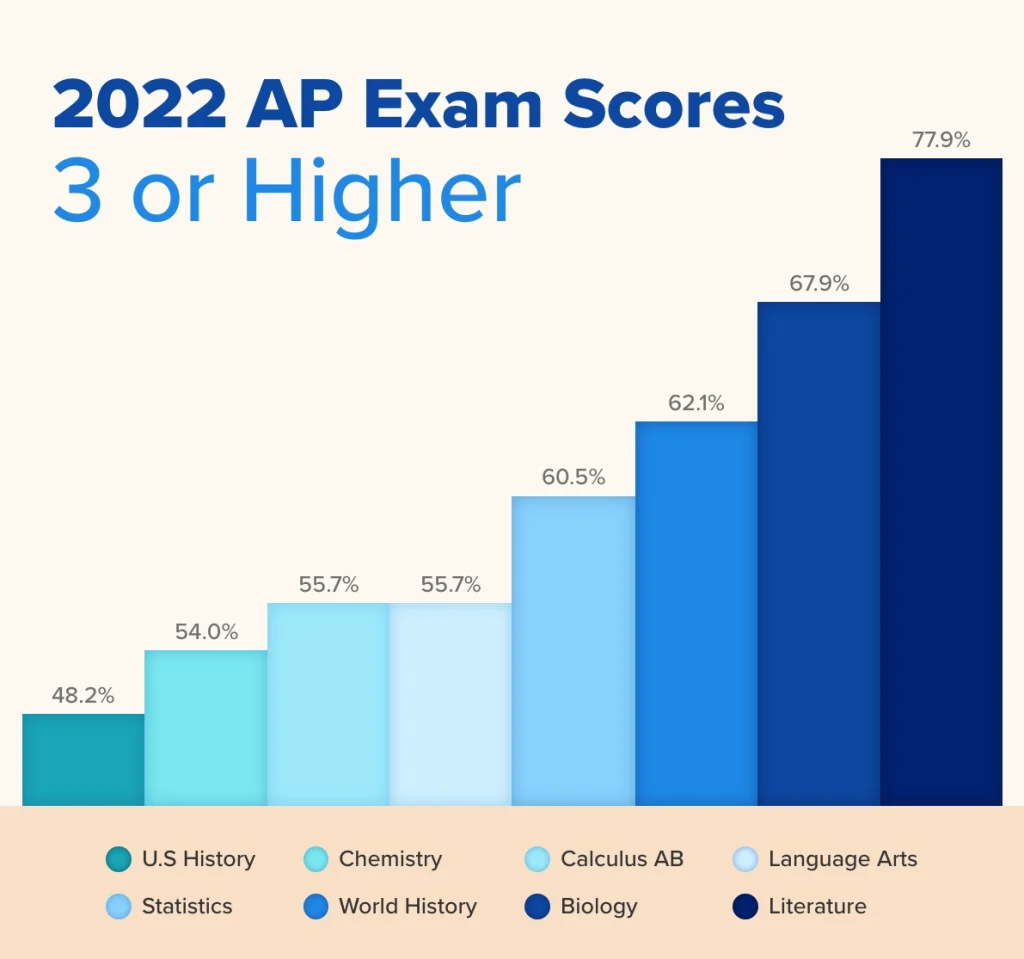
Student Score Distributions on AP exams (2022)
The best way for AP Literature teachers to help their students do well on the exam is to give them a challenging final review that is well thought out. And to make that a little simpler, we’ve offered five last-minute AP Lit exam tips that can be incorporated into any content spiraling plan for test preparation.
Tip 1: Break Curriculum into Smaller, Doable Parts
The main reason for the final few weeks of AP Lit exam preparation before the assessment is to spiral through all of the content units that may be tested. However, when there isn’t much time before the exam, it can be difficult to cover all of the course material necessary to make sure that students are prepared. This is why “chunking,” or dividing study material into manageable chunks, is a great test preparation technique, according to a study from the Educational Psychology Review2.
Simply put, breaking up information into manageable chunks can help students better understand the subject matter and, as a result, boost their level of confidence. Instead of attempting to cover everything during a single review session, teachers can break up an AP Literature unit or concept into smaller sections and work on each one separately. This improves their memory of what they have learned and allows them to focus on one subject at a time.

Interleaving, or reviewing several related topics at the same time, is another way AP Lit teachers can help their students get ready for the test. According to research, when teachers “interleave” different subject areas, their students learn to distinguish between what seem to be unrelated topics and are then able to find and learn from their similarities.2 By incorporating interleaving and chunking into their AP Lit exam prep, teachers can help their students feel more confident and ready for test day.
Our Choice for an AP Literature Exam Review Guide: AP English Literature and Composition: Study Guide
Our pick for the best study guide teachers can use for their AP Lit exam review is the EBSCO AP English Literature and Composition Study Guide.
Why We Chose It:
- Provides practice essay questions and sample responses to help students develop critical thinking and writing skills.
- Offers AP Lit exam tips and strategies for approaching multiple-choice questions and managing time during the exam.
- Includes summaries and analysis of classic works of literature commonly featured on the exam.
- Written by experienced educators and updated to reflect the most recent changes to the AP English Literature and Composition exam.
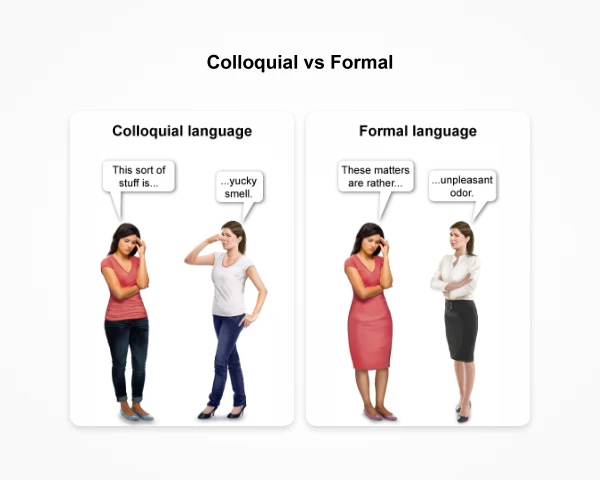
Tip 2: Practice with Released Exam Questions
Allowing students to practice with previously published exams is one of the simplest ways teachers can help their students get ready for the AP English Literature and Composition assessment. Doing so is almost guaranteed to raise student scores. According to research from the University of Nebraska-Lincoln3, having students practice with realistic test questions, such as those on released exams, raised scores by an average of 15%. In contrast, having students study with questions that were dissimilar from those on the real test only resulted in a 6% increase in test scores.
Our Choice for Released Exam Questions: The College Board Secure Released Exams
The best place to get released AP exams is directly from the source, so The College Board is our top recommendation for this tip. Released AP tests are not available to students, but AP teachers can use them for practice and review. These exams have also been made available in AP Classroom, both with other recently released questions and directly in the AP Question Bank.4 AP Literature instructors can find out more about the released exams in the AP Classroom User Guides.
Why We Chose It:
- They are a reliable and authentic source because these are actual exam questions from prior years
- Follow the current format and structure of the AP English Literature and Composition exam, including the number of questions, the types of questions, and the time limit
- There are many different question types and topics from previous exam questions
- Designed to be challenging but also cover a range of difficulty levels
Tip 3: Multiple-Choice Practice Makes Perfect
Naturally, practicing with multiple-choice questions is a crucial component of preparing for the AP Literature exam. AP Lit teachers should make an effort to get their students to complete at least two multiple-choice questions a day while spiraling through review material. Multiple-choice exit tickets or bellringers can help students review key ideas that might be covered on the test.
Students can develop the habit of using annotations, paying attention to context cues, and discarding answers that are blatantly incorrect by regularly practicing with multiple-choice questions. This habit will increase their test-taking effectiveness and accuracy. Practice with multiple-choice questions may help students manage their time better and get a better feel for the test’s pace.
Our Choice for Multiple-Choice Practice: UWorld
Our pick for the best multiple-choice practice resource is UWorld’s Learning Tools for AP Courses. It’s an excellent way to include multiple-choice questions in last-minute AP Literature exam preparation.
When using UWorld’s multiple-choice questions, students receive excellent explanations. By altering each lesson, adaptive learning technology offers students practice that is catered to their understanding level. All throughout the school year, students can use it to review what they’ve learned, identify their areas of strength and growth, and advance their knowledge and abilities in order to be prepared for the AP Literature exam. In the last few weeks of test preparation, it also gives students a quick way to review concepts and practice multiple-choice questions.
Why We Chose It:
- Provides immediate feedback to students and a breakdown of acceptable and unacceptable responses. Receiving in-depth explanations for AP English Literature and Composition questions will help students better understand the underlying concepts and hone their problem-solving skills
- Provides hundreds of multiple-choice practice questions and thoroughly covers all the material covered on the AP Literature exam
- Practice questions are timed, which helps students get used to the AP Lit exam’s time limitations and enables teachers to gauge their students’ proficiency with the exam’s time constraints
- Enables teachers to select specific subjects and question types for their students to practice, enabling personalized practice sessions. This makes it possible for teachers to focus their review on the areas in which their students most need help and ensures that they are well-prepared for the test
Tip 4: Greater Understanding with Justifications – Studying for FRQs
One of the most obvious differences between education today and education a few decades ago is understanding the value of understanding. Instead of just providing a solution, teachers should assist students in understanding how a concept actually works. When preparing for the AP Literature exam, it’s necessary to give students plenty of opportunities to show their thinking behind their answer choices. According to a study that was published in the Journal of Computer-Assisted Learning5, students who had to justify their answers to questions had a better understanding of the material than those who were only required to provide answers. A learner can better understand the topic and retain it if written explanations are added to the learning process.
Students will be better prepared for free-response questions if they are required to justify their answers in writing. Providing online examples of excellent FRQ responses will also help students do well on the AP Lit exam. Teachers and students can work together to come up with ideas for FRQ answers by looking at sample questions.
Our Choice for Additional FRQ Practice: APStudy.net
APStudy.net is a great place to get more FRQ practice for the AP English Literature and Composition exam. It has a large database of prompts and sample answers with comments and feedback from experienced teachers, as well as scoring rubrics and options for customizing practice, all of which are available for free online.
Why We Chose It:
- Offers a large database of FRQ prompts
- Provides sample student responses with annotations and feedback from experienced AP English Literature and Composition teachers
- Allows students to customize their practice by selecting specific types of prompts or literary works to focus on
- Includes scoring rubrics to help students understand how their responses will be evaluated on the actual exam
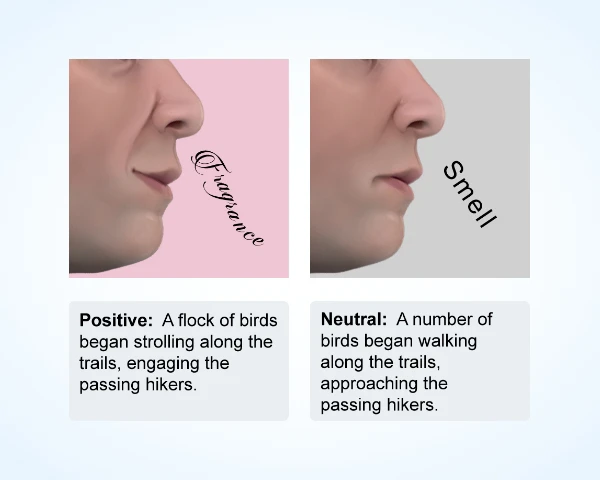
Tip 5: Repetition with Flashcards
When reviewing previous course material and key words, repetition is an excellent way to ensure that the information is remembered. Flashcards allow students to actively learn while honing their retrieval abilities, which prolongs their memory. According to the Central Penn College Learning Center, “Flashcards help students to engage in active recall or a process wherein students actively engage in learning by stimulating our memories and creating lasting connections to the material.”6
Teachers must go over a wide range of concepts and essential vocabulary words with their students as they get ready for the AP Literature exam. Students will remain engaged and motivated if there are flashcard-based activities during the review of these concepts in class. Flashcards can be used by students to study individually or in groups. Regular flashcard-based review activities in AP Lit classes can help students remember and understand important course information.
Our Recommendation for AP Literature Flashcards: UWorld
Our top pick for a source of AP Lit flashcards is the UWorld flashcards feature. The UWorld flashcards feature is a versatile and useful way for students to review and advance their understanding of the material. They can design their own decks and focus on particular course topics. Its user-friendly interface and flexibility make it a useful study tool for AP Literature exam preparation.
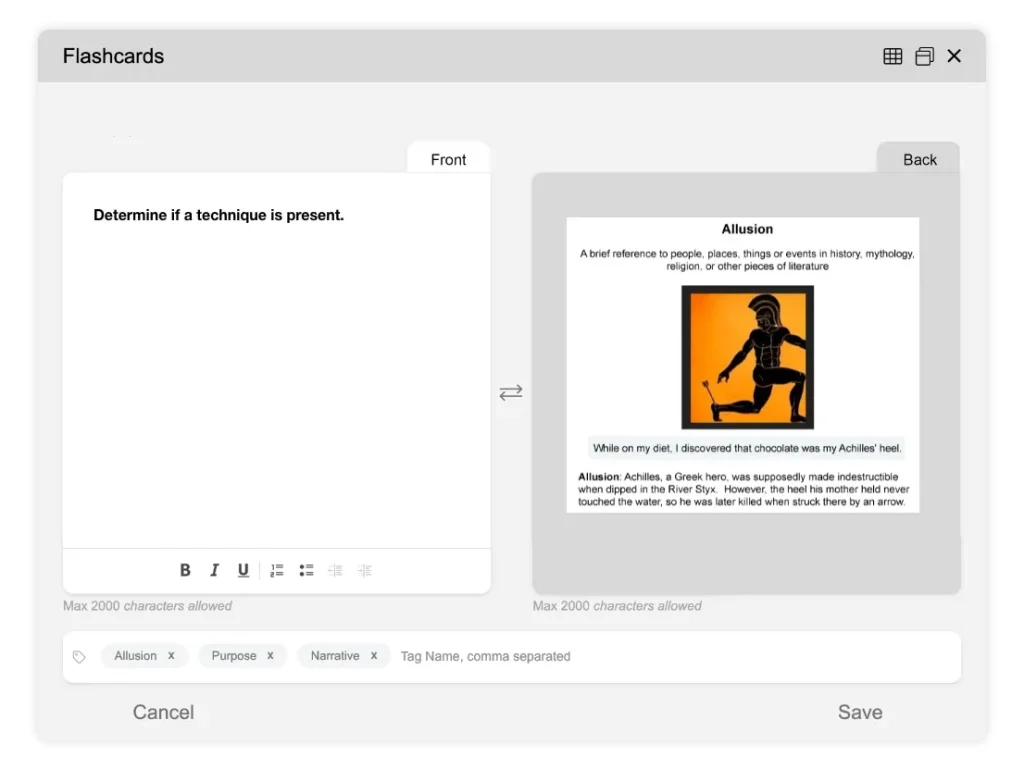
Teachers can also give students different review tasks that require them to use paper flashcards. Here are some suggestions for how to use them in your AP Lit exam preparation.
Understanding is More Important than Memorizing:
In order to improve your understanding of the subject matter as a whole, try to make connections between the information you are memorizing and other ideas.
Get Creative and Make Your Own Flashcards:
Making your own flashcards forces you to interact with the material and puts the information in your own words, which improves memory.
Use a Combination of Pictures and Words on Your Flashcards:
Your brain can establish connections between the linguistic and visual representations of the information by using both text and images on your flashcards, which can improve retention and recall.
Use Your Flashcards for Fun Review Activities:
Flashcard review can be made more enjoyable and engaging by including games or other enjoyable activities. This can improve retention and foster a better attitude toward learning.
Understanding is More Important than Memorizing:
In order to improve your understanding of the subject matter as a whole, try to make connections between the information you are memorizing and other ideas.
Get Creative and Make Your Own Flashcards:
Making your own flashcards forces you to interact with the material and puts the information in your own words, which improves memory.
Use a Combination of Pictures and Words on Your Flashcards:
Your brain can establish connections between the linguistic and visual representations of the information by using both text and images on your flashcards, which can improve retention and recall.
Use Your Flashcards for Fun Review Activities:
Flashcard review can be made more enjoyable and engaging by including games or other enjoyable activities. This can improve retention and foster a better attitude toward learning.
Bonus Tip: Prepare Students with Test Day Reminders
This final piece of advice in our series of last-minute AP Lit exam tips might seem more like general test-taking guidance than a suggestion for exam prep, but it’s important to go over what students should prepare for and bring to the test. Each year, students forget to turn off their phones or bring a pencil to their Advanced Placement exams, or they arrive late. However, according to a study by The College Board7, students who arrived on time and had everything they needed for their AP exam performed 20 points better on average than those who were late or had forgotten their supplies. Review a list of everything your students need to do to prepare for the AP Lit exam, as well as the supplies they’ll require on test day.
Checklist of Reminders for AP Literature Students
The Day Before the AP Lit Exam:
Gather your materials and get ready for the test
Avoid overstudying for the test
Drink plenty of water and consume a balanced meal
Engage in activities that will help you unwind and reduce your stress
Review testing strategies
Make sure to double-check the exam’s location and start time
Make sure you wake up on time by setting multiple alarms
Put a valid photo ID in your bag along with everything else you’ll need
Make travel plans to the examination location
The Day of the AP Lit Exam:
Bring a pen with black or dark blue ink
Bring a valid photo ID issued by the government
Bring the AP student packet you were given, which contains the AP number label and a demographics sheet
Bring your exam ticket or confirmation of registration with you
Bring a watch so you can keep an eye on the time
Bring a snack and some water. These must be left on the ground the entire test and only touched during breaks
Key Takeaways
For teachers who want to give their students the best content review and AP Lit exam preparation, the final few weeks before the test are unquestionably crucial. This article gives five suggestions that AP Literature teachers can use to help their students feel more confident and ready for tests.
Learn more about how we strive to support AP teachers who want to make a difference in the lives of their students with our Learning Tools for AP Courses.

References
- Student Score Distributions* AP exams – May 2022. (n.d.). Retrieved March 22, 2023, from https://apcentral.collegeboard.org/media/pdf/ap-score-distributions-by-subject-2022.pdf
- Rohrer, D. (2012, July 28). Interleaving helps students distinguish among similar concepts – educational psychology review. SpringerLink. Retrieved March 21, 2023, from https://link.springer.com/article/10.1007/s10648-012-9201-3
- The effects of age and professional expertise on … – Wiley Online Library. (n.d.). Retrieved March 22, 2023, from https://onlinelibrary.wiley.com/doi/abs/10.1002/acp.1467
- Formative assessment. AP For All. (n.d.). Retrieved March 29, 2023, from https://apforallnyc.com/formative-assessment/
- Let me explain! the effects of writing and … – Wiley Online Library. (n.d.). Retrieved March 22, 2023, from https://onlinelibrary.wiley.com/doi/10.1111/jcal.12608
- Libguides: Learning Center – Study Skills: Flashcards. Flashcards – Learning Center – Study Skills – LibGuides at Central Penn College. (n.d.). Retrieved March 22, 2023, from https://guides.centralpenn.edu/c.php?g=695569&p=4999857
- Source: College Board. (2021). AP Exam Score Distributions. Retrieved from https://reports.collegeboard.org/media/pdf/2021-ap-student-score-distributions_1.pdf

